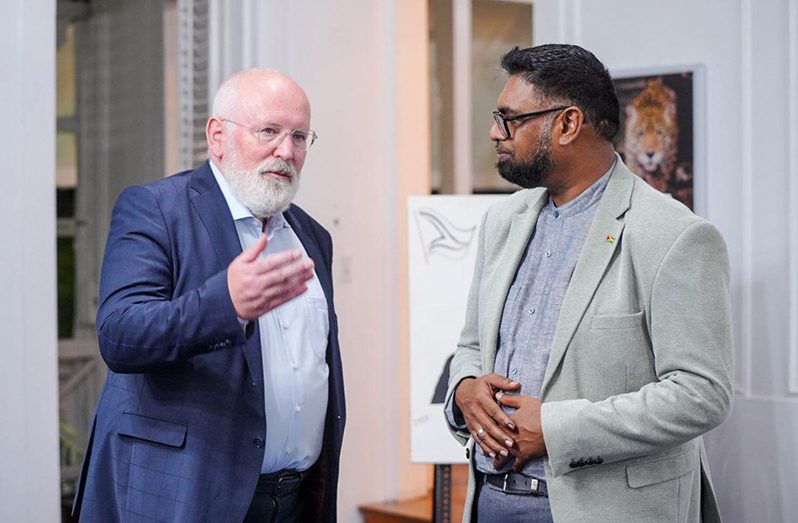PRESIDENT Dr Irfaan Ali described the European Union as one of Guyana’s strongest partners in protecting its sea defences, speaking in context of Guyana and the EU signing an agreement to utilise part of a €4.6 million grant for a mangrove protection and restoration project along Guyana’s coastline.
The signing ceremony Wednesday evening was attended by Frans Timmermans, the First Vice-President of the European Commission (EC), who is on a two-day visit to Guyana, and Dr. Ashni Singh, Senior Minister with responsibility for Finance, signing on behalf of Guyana.
The project will involve the monitoring of mangroves, seedling planting, and the rehabilitation of existing mangrove forests.
The project will be executed by the National Agriculture Research and Extension Institute (NAREI), in collaboration with the Ministry of Public Works (MoPW) and the sea defence authority.
In brief remarks at the signing ceremony, President Ali noted that with the length of Guyana’s coastal sea defence running some 525 km, the development and expansion of the mangroves play a very significant role in protecting several areas along the country’s coast.
The funding for the project will come through budget support.
“The European Union continues to play a key partner for us in budget support. You are also an important partner for us in the democracy in governance issues but importantly, one of our strongest partners in terms of protecting our sea defences or a coastal line and ensuring that a country that is below sea level remains safe from its exposure to the sea. You are one of our strongest partners in this area,” Dr Ali said.
Dr. Ali noted that the expansion of mangrove is a proven concept for climate mitigation.
“Guyana forest covers 18 million hectares; over 200,000 hectares is coastal area is covered in mangroves and suitable for the rejuvenation and expansion of mangroves. Mangroves store five times the carbon stock as other forest type, and this is an important fact. Also…the mangroves are closely integrated into the bulk of the population. It provided important opportunity for livelihood production. All of these things can help in optimising the value of the mangrove,” the President said.
The project is part of the Memorandum of Understanding (MoU) on a forest partnership between the EU and Guyana, which was signed on the sidelines of COP 27 in Egypt last year.
Also making remarks at the signing ceremony, Timmermans noted that the signing of the agreement marked the continued strengthening of the ties between Guyana and the EU.
“It is important that we strengthen our bilateral ties; that we look for ways to cooperate and one of the ways to cooperate is to help preserve this country’s natural riches which are almost without limits. I was able to witness some of it today,” Timmermans noted.
He further added: “This partnership that we’ve just signed is so that we can support the efforts of Guyana to strengthen the position of mangroves. Mangroves are such a huge contribution to our fight against the climate crisis. They are a huge reserve of biodiversity. If you look at the extent of the mangroves in this country, it is a collective responsibility of humanity to maintain them. And I am just more than happy that we can be partners with Guyana in this effort.”



.jpg)










